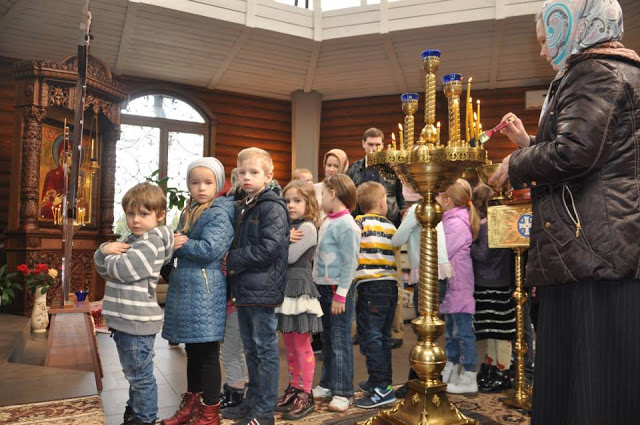
It all began with our forefathers, Adam and Eve. They received a commandment in paradise not to taste of the tree of the knowledge of good and evil (cf. 2:17). The commandment not to “taste of this or that” is quite well known to any Orthodox Christian. This is the commandment to fast—the most ancient, beginning factor of family life.
As we know, the first family was tempted by satan, the forefather of all evil. That envier could not calmly watch their happy life. Adam and Eve broke the commandment of not eating. The Lord called them to account. Then they tried to place their own blame on someone else, as if they were not guilty at all. Not only that, but Adam blamed his wife, who, as he emphasized, he had received from God. That is how the fall into sin happened, and people did not repent of what they had done. The Lord deprived them of paradise, and gave them a penance.

Let us briefly recall the words of that penance from God. The wife was told: I will greatly multiply thy sorrow and thy conception; in sorrow thou shalt bring forth children; and thy desire shall be to thy husband, and he shall rule over thee (Gen. 3:16). To the husband, the Lord said, In the sweat of thy face shalt thou eat bread, till thou return unto the ground; for out of it wast thou taken: for dust thou art, and unto dust shalt thou return (Gen. 3:19).
Sorrows entered the life of human beings. Steadfast endurance of sorrows is an important part of asceticism.
Our task is to remember that sorrows came as the result of sins. We have to bear them without anger, without murmuring against God. It is painful to be sick, painful to die (to return to dust). This feeling of sorrow must be melted in repentance. Then those oppressive thoughts of death can become exalted; they can become the remembrance of death.
After the fall, Adam not only had to work—he had to work hard. That is how it was in his life, and that is how it is in ours. Every man has to think about how he will feed himself and his family. He must at times do work that is both hard and dreary.
Archimandrite Sergei (Shevich) often found that his parishioners were sometimes weighed down by the work that they had to do every day. Fr. Sergei pointed out to them that work for a married person is the same as an obedience for a monk. As we know, monks do not choose their obedience according to their own taste. The monastic does whatever he has been given the blessing to do. Be it unattractive and boring, obedience nevertheless accustoms a monk to cutting off his own will, and, accordingly, to do the will of God. For Adam and his descendants, God’s will is to live after the fall under non-paradisal conditions, not to complain about this, and to repent. They should also hope in God, Who leads people to His Kingdom.
For a woman, a time of particular trial is pregnancy. She has to think more about her child than about herself, to pay special attention to her own health, keep to a regime, and, perhaps leave a lucrative job for the sake of her child—to give up her planned career growth. This is her ascesis of self-restraint. This is not to mention the pain of childbirth, and the uninterrupted care and fuss over the newborn.

The infant’s parents have to deny themselves basic rest, and are sleep deprived. They worry about their little one, and pray during anxious times for their child’s well-being: “Lord, You know all things, and Your love is perfect. Take the soul of (name), and do what I wish to do, but cannot.”
And if the child was born handicapped… What faith in God’s Providence is needed in order to bear that heavy cross!
Almost immediately after the birth of a child a great labor begins—raising the child. Even if we take the non-religious side of the matter, we know that we cannot get by without God’s help. Fr. Gleb Kaleda was right when he insisted that the foundation of upbringing and education is placed in the family, while school and college serve only to supplement what has been done in the family. The supplement is important, but it only enhances the main thing.
Often we see that in school children are required to memorize information, but taught very little about how to think for themselves. Even less are they taught morals. What should be done in this case? The family can make up for the inadequacies of an impersonal and commercial education and upbringing—that is if the parents seriously take care of their child, and not only of his physical needs, but also his emotional needs. All this takes many patient years.
Parents are also called to care for the spiritual needs of their child. It would be good to teach the small child to pray (in the majority of schools and universities, he will not be taught to pray to God). But to do this the parents themselves need to know how to pray attentively, to understand the language of prayer, and to accessibly explain the essence of the church services to their child. As the child grows to school age, he should be prepared for his first confession. How can parents explain to him what sin is, and why he needs to tell the priest about his sins. Here one’s personal example is needed, the parents’ personal efforts on the spiritual path. If the mother takes the child to Communion but does not herself approach the chalice or go to confession, if the father goes only rarely to church, then it will be pretty hard to convince the child that all of us need the Church Sacraments.

In the home where there is no understanding of breakfast, lunch, and dinner, where everyone eats whenever they want (and even when they don’t want), it is hard for a child to assimilate the concept of fasting. “You can’t lead children to fasting if they are allowed to eat whenever they like, if they are allowed to run through the house with a piece of bread and sausage or a biscuit. Regularity of food intake is, if you will, the beginning of Christian ascesis… Through prayer before a meal a person learns to begin everything with prayer. If there are visitors in the house and it is not possible to pray in front of them, it is important that all members of the family cross themselves if only mentally… It is necessary to cultivate both the obvious and secret forms of everyday Christian life,” Fr. Gleb Kaleda used to say. Domestic life can become a good support for spiritual life, but it can also become a profound obstruction.
***
The passion of self-love stands out as the family’s worst enemy. Egoism is a dangerous enemy.
When a married couple does not want to yield to each other in anything, each morbidly guarding his or her own pride; if each continually counts the times that he or she did something for the family, then that family will little-by-little fall apart. If couples easily give place to anger, argue over trifles, and cannot peacefully live with each other’s close relatives, then they themselves feel wretched, and their children absorb their bad example. How hard it is to bring up children by our own example!
True ascetic labor is required of parents in order not to consign their children to the education of television, internet groups, or the streets. That is on the one hand; on the other hand, children must not be tortured with excess care. After all, super-care leads to infantilism, introversion, and sometimes even rebellion against parents.
The family is a school of love.
All Christian ascesis is directed toward acquiring love. Christ the Savior boiled down all the commandments to two: love of God and love of neighbor. St. Theophan the Recluse compares love to fire: if we do not throw logs on the fire it will go out; if love between husband and wife is not stoked with deeds of love, it will eventually die out. And what are these deeds of love? They are the deeds of basic care one for the other, obvious and unobvious signs of attention. They are the ability during arguments to overcome outbreaks of anger and to be the first to come and make peace. They are the ability to take your egotistical inclinations in hand, to correct your actions, always thinking to yourself “I am not the only one.”
Fr. Gleb Kaleda wrote very well and in detail in his book about the ascetical life in a family, The House Church. His book is firmly supported by Orthodox tradition that has gone down through the ages, but he does not close his eyes on the particulars of Christian life in our complex times.




